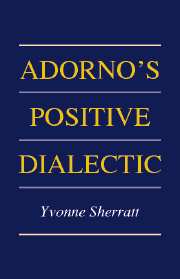Book contents
- Frontmatter
- Contents
- Preface
- Abbreviations
- Adorno's Positive Dialectic
- General Introduction
- PRELUDE TO ADORNO'S POSITIVE DIALECTIC
- Prelude I: Adorno's Intellectual Tradition: German Philosophy
- Prelude II: Adorno's Intellectual Tradition: Sigmund Freud
- ADORNO'S POSITIVE DIALECTIC: INTRODUCTION
- PART I NEGATIVE THESIS: THE DECLINE OF ENLIGHTENMENT
- PART II POSITIVE THESIS: THE REDEMPTION OF ENLIGHTENMENT
- Bibliography
- Index
Prelude II: Adorno's Intellectual Tradition: Sigmund Freud
Published online by Cambridge University Press: 10 August 2009
- Frontmatter
- Contents
- Preface
- Abbreviations
- Adorno's Positive Dialectic
- General Introduction
- PRELUDE TO ADORNO'S POSITIVE DIALECTIC
- Prelude I: Adorno's Intellectual Tradition: German Philosophy
- Prelude II: Adorno's Intellectual Tradition: Sigmund Freud
- ADORNO'S POSITIVE DIALECTIC: INTRODUCTION
- PART I NEGATIVE THESIS: THE DECLINE OF ENLIGHTENMENT
- PART II POSITIVE THESIS: THE REDEMPTION OF ENLIGHTENMENT
- Bibliography
- Index
Summary
Adorno and Horkheimer significantly alter both the German philosophical traditions of Kantian critique and post-Kantian philosophy of history by incorporating the pathbreaking findings of Freud into mainstream German philosophy. In Whitebook's words, ‘the assimilation of psychoanalysis provided the Frankfurt School with the concepts needed … to comprehend the central dynamics and pathologies of modern rationality, individuals and culture’. In view of this, to understand further Adorno and Horkheimer's philosophy of history we need to turn to their appropriation of Sigmund Freud. Herein we articulate three points: First Freud's basic theory of the psyche; second, which particular aspects of Freud's theory are appropriated by Adorno and Horkheimer, and; third, and most importantly, how they map Freudian theory onto the German tradition of philosophy of history.
FREUDIAN PSYCHOANALYSIS
For the benefit of those philosophers less familiar with Sigmund Freud, let us briefly introduce his key relevant ideas. Writing in late nineteenth-century Vienna, the Austrian neurologist and psychologist founded psychoanalysis. Based on his research into the condition of hysteria, Freud developed a theory of the human psyche as in conflict with itself. He composed an analysis of psychosexual development in the human being as a way of accounting for kinds of behaviour with no apparent cause.
His theorising developed from his early to his later years and we can usefully divide his work into five, closely interconnected, theoretical languages – note that these are conceptual divisions and not always strictly biographical, although we have tried to follow the overarching trajectory of Freud's life.
- Type
- Chapter
- Information
- Adorno's Positive Dialectic , pp. 50 - 70Publisher: Cambridge University PressPrint publication year: 2002



